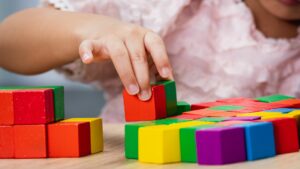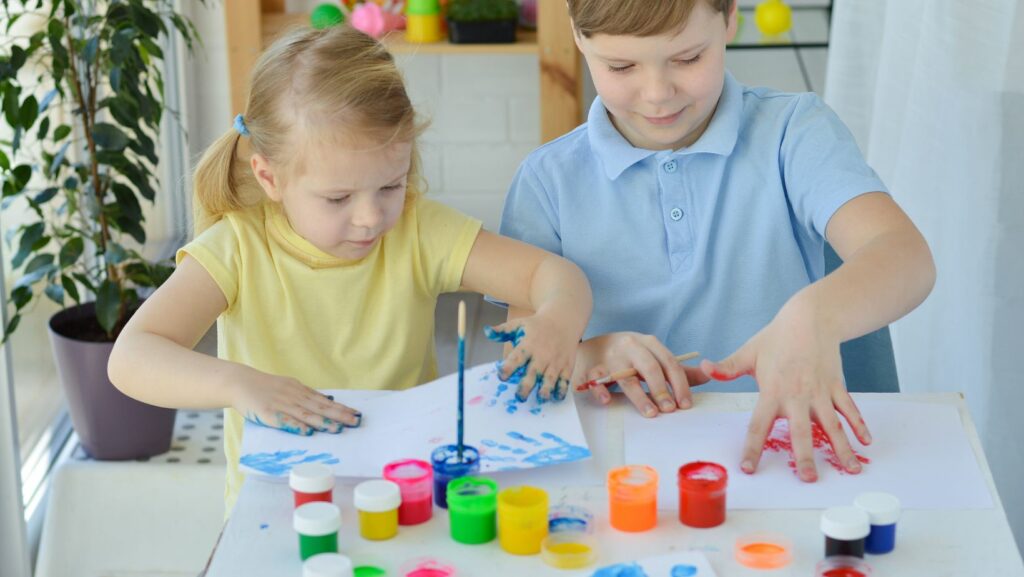Playtime isn’t just fun and games. It’s a crucial part of a child’s development, shaping their social, cognitive, and emotional growth. But did you know there are different types of play, each with its unique benefits?
From solitary play to cooperative play, the types of play a child engages in can vary greatly. They can offer insights into their developmental stage, personality, and even their future skills. So, let’s dive in and explore the world of play in child development, unmasking the hidden layers of learning and growth that lie beneath the surface of a child’s playtime.
Types of Play in Child Development
 A child’s playtime isn’t just fun—it also forms a cornerstone of their holistic development encompassing mental, physical, emotional, and social areas. This section delves deeper into the essential aspects of play in child development, offering insights into its critical role and the developmental benefits it brings across different age groups.
A child’s playtime isn’t just fun—it also forms a cornerstone of their holistic development encompassing mental, physical, emotional, and social areas. This section delves deeper into the essential aspects of play in child development, offering insights into its critical role and the developmental benefits it brings across different age groups.
Play, often perceived as a child’s form of recreational activity, carries a deeper significance. It involves imaginative activities that can be either structured—planned and organized, or unstructured—spontaneous and free-flowing. Play—regardless of type, represents a child’s exploration, manifesting their understanding of the world.
Surprisingly, the act of play impacts a child’s development extensively. For example, role-play helps develop social skills, whilst construction play enhances problem-solving abilities. More importantly, play not only shapes cognitive abilities but can also foster emotional regulation and improve physical coordination. Thus, the act of playing holds weight beyond momentary joy—it’s central to a child’s developmental progress.
Play offers myriad benefits, varying markedly across different age brackets. For instance, infants thrive on sensorial experiences. Engaging in play-based activities like shaking a rattle or feeling textures aids their sensorial development, assert Neuroscience researches. In contrast, toddlers indulge in pretend-play, catalyzing creativity, while also honing language skills.
Categories of Play in Child Development
 Building upon child development’s different play forms, it’s time to consider another crucial distinction: Unstructured versus Structured play and Indoor versus Outdoor play. These categories offer unique developmental advantages for children as they each foster various skills and understanding levels important at different developmental stages. Unstructured play, often referred to as free play, allows the child’s creative imagination to run wild. Children make their rules, create their fantasy world, and explore their interests. In unstructured play, no explicit goals are set, providing children with the freedom to express themselves creatively and emotionally. Children engaged in unstructured play often excel in problem-solving, flexibility, and decision-making, given the liberty to figure things out on their own.
Building upon child development’s different play forms, it’s time to consider another crucial distinction: Unstructured versus Structured play and Indoor versus Outdoor play. These categories offer unique developmental advantages for children as they each foster various skills and understanding levels important at different developmental stages. Unstructured play, often referred to as free play, allows the child’s creative imagination to run wild. Children make their rules, create their fantasy world, and explore their interests. In unstructured play, no explicit goals are set, providing children with the freedom to express themselves creatively and emotionally. Children engaged in unstructured play often excel in problem-solving, flexibility, and decision-making, given the liberty to figure things out on their own.
In contrast, structured play is organized, guided, and often has a specific learning objective. Be it a guided craft activity or a timed puzzle, children have clear instructions to follow and goals to achieve. It boosts discipline, organization skills, focus, and perseverance, as children strive to reach the expected outcome.
Types of Play and Their Roles
 Various forms of play serve distinct roles in child development, each contributing to a different aspect of a child’s growth. This exploration of play types expands on how physical, cognitive, social, and creative play facilitate development across different competencies. Physical play, comprising activities like running, jumping, or climbing, nurtures motor skills in children. It supports the fine-tuning of both gross motor skills, which include larger movements of the arms, legs, or entire body, and fine motor skills, involving precise movements, like picking up small objects. For instance, a game of tag helps improve gross motor skills through running and dodging, whereas building a tower of blocks enhances fine motor skills by delicately placing each block.
Various forms of play serve distinct roles in child development, each contributing to a different aspect of a child’s growth. This exploration of play types expands on how physical, cognitive, social, and creative play facilitate development across different competencies. Physical play, comprising activities like running, jumping, or climbing, nurtures motor skills in children. It supports the fine-tuning of both gross motor skills, which include larger movements of the arms, legs, or entire body, and fine motor skills, involving precise movements, like picking up small objects. For instance, a game of tag helps improve gross motor skills through running and dodging, whereas building a tower of blocks enhances fine motor skills by delicately placing each block.
Cognitive play targets intellectual growth and learning in children. Activities involving puzzles, matching games, or strategy-based board games stimulate cognitive development. For example, a child attempting a puzzle learns problem-solving, while a strategy-based game could improve tactical thinking. Cognitive play provides a practical and enjoyable platform for children to develop critical thought processes and cognitive abilities.
Incorporating dynamics of interaction and cooperation, social play fosters interpersonal skills in children. It could range from team sports to group activities like collaborative art projects. A child playing in a team learns cooperation, communication, and empathy towards teammates.

